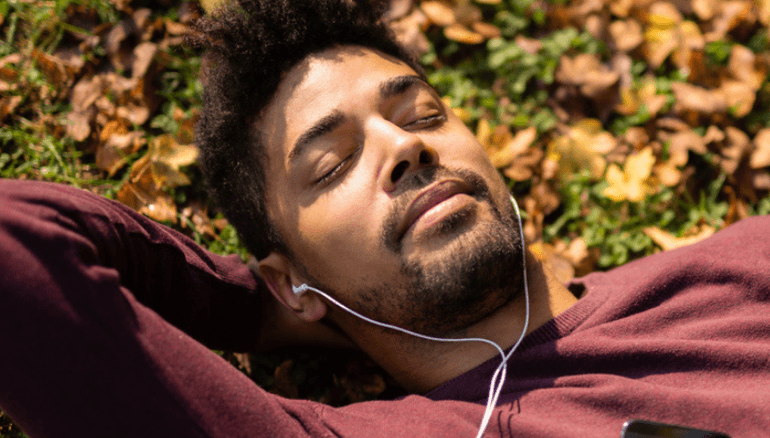We spend nearly half our time thinking about something other than what we’re doing in the present. This mindless autopilot can become a problem if we spend more time dwelling on painful memories, stressed about future hypotheticals or spiralling in constant self-criticism.
Enter, mindfulness. There isn’t one universal definition for mindfulness, but it’s generally understood to be the simple act of paying attention and being present in whatever you’re doing. Mindfulness is an innate state, which can be encouraged by certain practises such as meditation.
So, what exactly is meditation?
Meditation can be defined as a set of techniques that use focus to increase awareness, concentration and calmness, with both immediate and long-term outcomes.
There are many different types of meditation techniques, but they share a few common elements.
- Try to find a quiet location with minimal distractions
- Choose a comfortable posture, whether it’s sitting, lying down or walking
- Focus your attention — this could be on the sensation of your breath, a set of words or sounds
- Maintain an open attitude — when you notice your thoughts drifting, take notice and bring yourself back to the present without judging or punishing yourself.
Research hasn’t arrived at a consensus about how much meditation is “enough” but most people believe it works best when done regularly.
“Figure out a time when meditating works best for you, and if you’re struggling to set up a regular practice, try introducing short meditations into your routine with a habit you already have in place,” says Michael Hines, the Lead Psychologist at Smiling Mind — an Australian, non-profit web and app-based meditation program. “This could be before you eat breakfast, just after you brush your teeth or the first thing you do when you wake up.”
In the face of so many misconceptions around meditation and mindfulness, it’s almost easier to describe what they are not.
“A misconception is that mindfulness is a laborious task, but it doesn’t have to be,” Hines says. “The formal mindfulness practise of meditation can be practised anywhere, at any time, for as little as one minute. Mindfulness can also be brought into our everyday moments in a more informal way. It’s all about the quality of attention we bring to where we are and what we are doing.”
Jason Partington, meditation instructor and co-founder of Meditation for Men, finds that many of his clients expect to “sit in incense, hold hands and sing Kumbaya.”
“There’s a belief that it’s this feminine, religious activity,” Partington says. “They’re confronted by that and they don’t see themselves doing that, but when they experience it, they realise meditation is actually quite an amazing and accessible thing to do.”
Partington first turned to the practise two decades ago during a particularly rough patch for his mental health.
“I was probably your typical Aussie, footy-playing stereotype at the time,” he says. “I was really just living a life based on social expectations and what the media says ‘this is what a guy should look and act like, and this is what success and happiness looks like’ and a lot of that is not healthy.”
As a result, he felt pretty lost by 28 years old.
“Not knowing who I was and what I wanted, and escaping into alcohol,” he says. “I ended up depressed and not feeling very good about myself.”
A friend put him onto meditation through a five-week course, which Partington says, “Changed the world for me, it was like a 180-degree transformation.” This led to an ongoing exploration of meditation, its methods and masters, before starting up a business to help other men understand and implement its benefits.
The benefits behind the buzzwords
The 2020 State of Mind survey showed that awareness and appreciation of mindfulness is increasing in Australia, with 63.5% of respondents having heard of mindfulness and 57.1% having tried it1.
“Whilst mindfulness is a construct that stems from Buddhist meditation traditions, it has received a great deal of attention over recent decades in Western medicine, psychology, and neuroscience,” says Hines.
The main focus has been on how the habit can support our psychological wellbeing.
“Men are no doubt aware of the importance of caring for their physical health, but less so with regularly assessing the state of their mental health — something which is just as important,” Hines says. “While not all of us will experience a mental illness in our lifetime, we all have mental health, and therefore need to be proactively checking in on how mentally healthy we’re feeling.”
Mindfulness and meditation are effective at improving anxiety, pain, and depression, especially major, recurrent depression2. There are significant improvements in psychological wellbeing in those dealing with long term physical conditions3.
“The practice of mindfulness and other meditation strategies is about being able to get better at letting go of unhelpful thoughts or being able to find more space for uncomfortable emotions instead of feeling like we need to distract ourselves or push them away or like we can’t cope with it,” Psychologist Narelle Dickinson says.
This self-regulation can bring our mental processes under greater control, helping with not just calmness but concentration too. Whether that’s in your nine to five or on the sporting field — athletes like the Australian cricket team, Richmond AFL team, and LeBron James are fans of the practice.
“It’s become, for many, a secular practise to support wellbeing, performance, and connection to self and others,” Hines says.
However, there’s still plenty we don’t know about mindfulness and meditation and in some areas, the science doesn’t match up to the hype. A critical evaluation of the research shows that there are problems with how mindfulness is defined as well as methodological issues in mindfulness research4.
And keep in mind that mindfulness isn’t magic. When managing mental health, mindfulness and meditation should always be used to accompany other strategies, not replace them.











